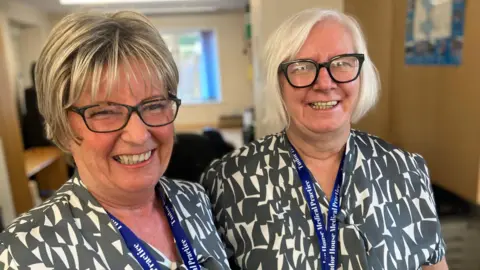In the hectic landscape of healthcare in England, securing a GP appointment can often feel like a high-stakes challenge. This phenomenon, commonly referred to as the “8am scramble,” is a daily ritual for countless patients across the UK, and it is particularly pronounced at establishments like Tudor House Medical Practice in Nottingham. The practice’s telephone lines open promptly at 08:00, and a rush of patients simultaneously attempts to call for same-day appointments. This routine has created significant frustration for both patients and staff alike.
At the heart of the practice’s operation are dedicated receptionists, notably Jayne Bond and Sandra Brewster, who bear the brunt of patient grievances when appointments are limited. Jayne expressed the exasperation often directed at receptionists, remarking, “Some people think we are Rottweilers, and we are trying to stop them from securing the appointments they need.” The stereotype that receptionists serve as gatekeepers to healthcare access reveals the tension that surrounds the appointment system—a system that is under significant strain due to overwhelming demand.
On a recent Wednesday morning, described by Jayne as “wacky Wednesday,” the reality of this pressure became palpable. Within moments of the phone lines opening, over 30 patients were already queued, eagerly attempting to reach the receptionists. Sandra noted, “When the phone lines open, it just goes manic,” emphasizing the rapid influx of requests and the ensuing chaos as receptionists strive to manage the calls. With 80% of face-to-face appointments available for booking on the same day, the limited availability leads to appointments being filled almost instantaneously.
Despite recent upgrades to the telephone system, which introduced features like callback requests, many patients still experience frustration and, at times, lash out at the reception staff. Sandra shared, “People have said to me, ‘Well, if I die it will be your fault.’” This level of verbal abuse is a stark reminder of the emotional toll this job demands, forcing staff to compartmentalize their experiences and not take negativity personally. The persistent challenge of rising demand for appointments has not gone unnoticed, prompting government intervention earlier this year.
In light of soaring pressure on GP services, the Labour government committed to reforms intended to alleviate the burden on practices. This includes an annual funding increase of £889 million aimed at enhancing service delivery and expanding the availability of consultations. A critical element of the reform involves offering online appointment bookings throughout working hours, which is expected to streamline the patient experience and allow staff to direct those most in need to the appropriate care.
Tricia Gibbons, the manager of the Tudor House Medical Practice, is optimistic about these developments, noting that patients are increasingly accustomed to the idea that they may not always see a GP for their needs. The practice has evolved, with a diverse team of healthcare professionals taking on roles traditionally reserved for doctors, which allows for a more efficient use of resources. This shift, which includes the employment of advanced nurse practitioners and clinical pharmacists, aims to alleviate some of the pressures on GPs and create an environment where patients receive timely care for both minor and complex health concerns.
Dr. Jonathan Lloyd, a GP partner at the practice, echoed this sentiment, illustrating the increasing demand for healthcare. He acknowledged that the number of appointments per patient has significantly risen; more patients are older, with a growing prevalence of chronic illnesses such as dementia. Yet, he also conveyed a sense of caution regarding expectations for change, indicating that while there have been improvements, the challenges of accessibility and demand for primary care remain persistent issues.
As the system adapts, there’s a sense of hope that these changes will gradually lead to improvements in patient care and experience. Nevertheless, as Jayne and Sandra prepare for another wave of calls each morning, they are reminded that until real systemic change occurs, the 8am scramble—and its pressures—will likely remain a defining aspect of their daily work.



